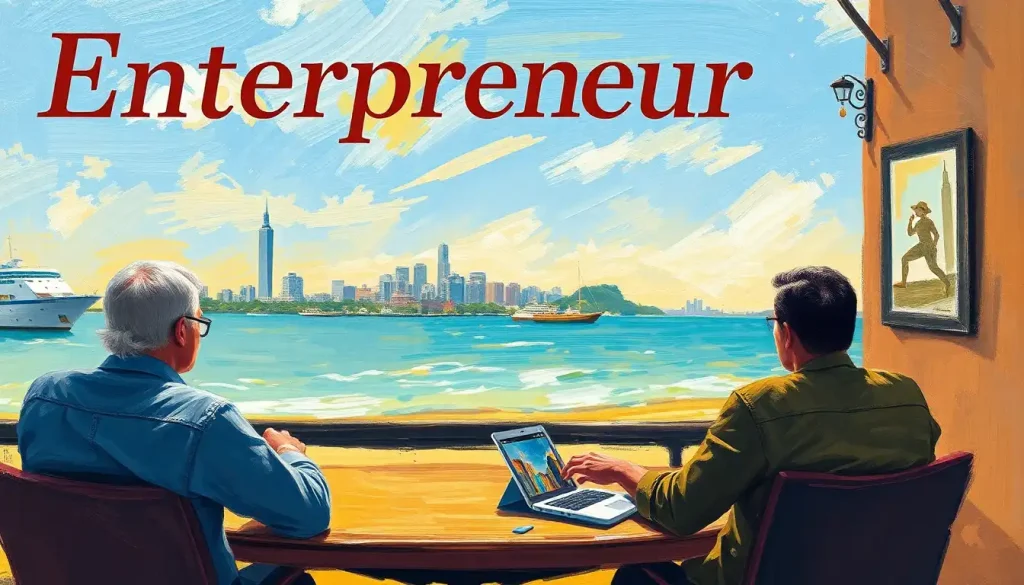Picture this: You’re a budding entrepreneur with a million-dollar idea, but you’re missing the secret sauce to turn that vision into reality—enter the game-changing world of fellowship programs. These powerhouses of potential have been quietly revolutionizing the entrepreneurial landscape, offering a golden ticket to those brave souls ready to take the plunge into the world of business creation.
But what exactly are these mystical fellowship programs, and why should you care? Well, buckle up, buttercup, because we’re about to embark on a wild ride through the entrepreneurial ecosystem that’ll make your head spin faster than a startup’s pivot strategy!
The Fellowship of the Bling: Defining Entrepreneur Fellowships
Entrepreneur fellowship programs are like the Hogwarts of the business world—minus the magic wands and talking portraits (although some mentors might seem just as wise as Dumbledore). These programs are designed to nurture and support budding entrepreneurs, providing them with the tools, resources, and guidance needed to transform their ideas into thriving businesses.
Think of it as a business boot camp on steroids. You’ll sweat, you’ll cry, and you might even question your sanity, but by the end, you’ll be ready to conquer the world—or at least your target market.
The concept of entrepreneurship fellowships isn’t new, but it’s evolved faster than a chameleon in a Skittles factory. What started as informal mentorship arrangements has blossomed into structured programs that can make or break a fledgling business. Today, these fellowships are the secret weapon in many an entrepreneur’s arsenal, offering a leg up in an increasingly competitive landscape.
But why are these programs so crucial? Well, my friend, in the cutthroat world of startups, it’s not just about having a brilliant idea—it’s about execution, connections, and knowing which pitfalls to avoid. And that’s where entrepreneurship fellowship programs come in, offering a treasure trove of knowledge and support that can mean the difference between becoming the next Steve Jobs or just another Joe Schmoe with a failed startup.
The Secret Sauce: Key Ingredients of Entrepreneur Fellowships
Now, let’s dive into the meat and potatoes of these programs. What makes them tick? What’s the special sauce that turns ordinary mortals into business moguls? Buckle up, because we’re about to spill the beans!
First up, we’ve got mentorship—the bread and butter of any fellowship worth its salt. Imagine having a Yoda-like figure guiding you through the treacherous waters of entrepreneurship, except instead of cryptic advice about the Force, they’re dropping knowledge bombs about market penetration and scalability. These mentors have been there, done that, and got the t-shirt (probably with their company logo on it). They’re the secret weapon in your entrepreneurial arsenal, ready to help you dodge the landmines that blow up many startups.
But wait, there’s more! These programs aren’t just about sage advice—they’re also about cold, hard cash. Many fellowships offer financial support that can help you keep the lights on while you’re busy changing the world. It’s like having a fairy godmother, except instead of a pumpkin carriage, you’re getting seed funding and maybe even a stipend. Talk about a Cinderella story!
Networking is another crucial component of these programs. It’s not just about who you know—it’s about who knows you. Fellowship programs are like the ultimate mixer, throwing you into a melting pot of fellow entrepreneurs, industry bigwigs, and potential investors. It’s like LinkedIn come to life, but with better snacks and fewer annoying connection requests.
Skill development is also a big part of the package. These programs offer workshops and training sessions that’ll make you feel like you’ve downloaded an MBA directly into your brain. From financial modeling to pitching techniques, you’ll be armed with a Swiss Army knife of business skills that’ll make you dangerous in the boardroom.
Last but not least, many fellowships offer access to industry experts and potential investors. It’s like having a backstage pass to the business world, giving you face time with the movers and shakers who can turn your startup dreams into reality. Who knows? You might just bump into your future angel investor while waiting in line for coffee.
Flavors of Fellowship: Types of Entrepreneur Programs
Now that we’ve covered the basics, let’s explore the smorgasbord of fellowship options out there. It’s like a buffet of opportunity, and trust me, you’ll want to sample everything!
First up, we’ve got university-based fellowships. These are perfect for those who miss the smell of textbooks and the thrill of all-nighters. Many top-tier universities offer programs that combine academic rigor with real-world entrepreneurship experience. It’s like getting an MBA, but with more pizza and less soul-crushing student debt.
Next, we’ve got corporate-sponsored programs. These are for those who want to dip their toes in the entrepreneurial waters while still having the safety net of a big company. It’s like having your cake and eating it too—you get to be a rebel with a cause, but with the backing of corporate resources.
For the do-gooders out there, non-profit and government initiatives offer fellowships that focus on social entrepreneurship. These programs are perfect for those who want to change the world and make a profit while doing it. It’s like being a superhero, but instead of a cape, you wear a blazer.
Industry-specific fellowships are another flavor to consider. These programs focus on particular sectors, like tech, healthcare, or green energy. They’re perfect for entrepreneurs who want to dive deep into a specific field and emerge as the next industry disruptor.
Finally, we’ve got global entrepreneurship programs. These are for the jet-setters who want to take their business ideas international. It’s like being James Bond, but instead of spy gadgets, you’re armed with a killer pitch deck and a passport full of stamps.
The Perks of Being a Fellowship Wallflower
Now, you might be wondering, “What’s in it for me?” Well, buckle up, buttercup, because the benefits of participating in an entrepreneur mentorship program are more numerous than the features in a SaaS startup’s product roadmap!
First and foremost, these programs offer accelerated learning and growth. It’s like strapping a rocket to your back and blasting through years of business experience in a matter of months. You’ll learn more in a fellowship program than you would in a decade of trial and error on your own.
Risk reduction is another major perk. Let’s face it, entrepreneurship is risky business. But with a fellowship program, you’ve got a safety net of mentors, resources, and support to catch you if you fall. It’s like entrepreneurship with training wheels—except these training wheels are made of solid gold and studded with diamonds.
Access to funding and investment opportunities is another huge draw. Many fellowship programs have connections to venture capitalists, angel investors, and other sources of funding. It’s like having a backstage pass to Shark Tank, but with less dramatic music and more realistic valuations.
Building a strong professional network is perhaps one of the most valuable benefits of these programs. You’ll be rubbing elbows with fellow entrepreneurs, industry leaders, and potential partners. It’s like LinkedIn, but in real life and with better coffee.
Finally, these programs offer unparalleled opportunities for personal development and leadership skills. You’ll emerge from the fellowship not just as a better entrepreneur, but as a better person. It’s like a self-help book, a leadership seminar, and a business degree all rolled into one delicious entrepreneurial burrito.
Securing Your Golden Ticket: How to Land a Fellowship
Now that you’re salivating at the prospect of joining a fellowship program, you’re probably wondering how to get your foot in the door. Fear not, intrepid entrepreneur! I’m about to spill the beans on how to secure your spot in these coveted programs.
First things first, research is key. You need to scout out the available opportunities like a detective on a caffeine binge. Look for programs that align with your goals, industry, and stage of business. It’s like online dating, but instead of finding your soulmate, you’re finding your perfect fellowship match.
Once you’ve identified your target programs, it’s time to prepare your application. This is where you need to channel your inner Don Draper and craft a pitch that would make even the toughest investors weep with joy. Your application should be so compelling that the selection committee will be fighting over who gets to call you first.
Interview preparation is crucial. This is your chance to shine brighter than a supernova in a pitch-black room. Practice your elevator pitch until you can recite it in your sleep. Be ready to answer tough questions about your business model, market potential, and why you deserve a spot in the program. It’s like preparing for a job interview, but the stakes are higher and the rewards are sweeter.
Understanding the common selection criteria can give you a leg up in the application process. Most programs look for innovative ideas, strong leadership potential, and a demonstrated commitment to entrepreneurship. It’s like a talent show, but instead of juggling or singing, you’re showcasing your business acumen and visionary ideas.
To maximize your chances of acceptance, go above and beyond in your application. Provide concrete examples of your entrepreneurial spirit, showcase any early traction or prototypes, and demonstrate a clear understanding of your target market. It’s like applying to college, but instead of extracurricular activities, you’re highlighting your startup hustle.
From Fellowship to Fortune: Success Stories
Still not convinced? Let me regale you with tales of entrepreneurial triumph that’ll make your head spin faster than a fidget spinner in a tornado!
Take, for example, the story of Sarah, a plucky entrepreneur who joined a university-based fellowship program with nothing but a half-baked idea and a dream. Through the program’s mentorship and resources, she transformed her concept into a thriving eco-friendly packaging company that’s now disrupting the industry. It’s like a Cinderella story, but instead of a glass slipper, she’s got a biodegradable shoe made from mushroom leather.
Or consider the case of Miguel, who leveraged his social entrepreneurship fellowship to create a revolutionary app that connects food banks with local restaurants to reduce food waste. Not only is he making a profit, but he’s also making a difference. It’s like Robin Hood, but instead of stealing from the rich, he’s redistributing surplus food to those in need.
These success stories aren’t just feel-good anecdotes—they’re proof of the long-term impact that fellowship programs can have on career trajectories. Many fellowship alumni go on to become industry leaders, serial entrepreneurs, and even mentors themselves. It’s like a virtuous cycle of entrepreneurial awesomeness.
The lessons learned from these experiences are invaluable. Fellows often report increased confidence, improved decision-making skills, and a deeper understanding of the business world. It’s like getting a Ph.D. in entrepreneurship, but with more practical application and fewer stuffy professors.
The Future is Fellowship: Wrapping It Up
As we wrap up this whirlwind tour of entrepreneur fellowship programs, let’s take a moment to reflect on the incredible value these opportunities offer. They’re not just programs—they’re launchpads for the next generation of business leaders, innovators, and world-changers.
Looking to the future, we can expect fellowship programs to evolve even further. With the rise of remote work and digital collaboration, we might see more virtual fellowships that connect entrepreneurs across the globe. Imagine brainstorming with a tech whiz in Silicon Valley, a sustainability expert in Stockholm, and a marketing guru in Mumbai—all from the comfort of your home office (or favorite coffee shop).
We’re also likely to see an increased focus on diversity and inclusion in fellowship programs. The business world is finally waking up to the fact that diverse teams lead to better outcomes, and fellowship programs are at the forefront of this shift. It’s like a melting pot of ideas, backgrounds, and perspectives, all coming together to create the businesses of tomorrow.
So, to all you aspiring entrepreneurs out there, I implore you—no, I challenge you—to seek out these fellowship opportunities. They’re not just programs; they’re portals to a world of possibility. Whether you’re dreaming of launching the next tech unicorn, revolutionizing sustainable fashion, or creating a social enterprise that changes lives, there’s a fellowship program out there with your name on it.
Remember, in the words of the great philosopher Ferris Bueller, “Life moves pretty fast. If you don’t stop and look around once in a while, you could miss it.” The same goes for entrepreneurship. Don’t let the opportunity to accelerate your success through a fellowship program pass you by. Your million-dollar idea deserves the best chance at becoming a billion-dollar reality.
So go forth, brave entrepreneur! Apply to that fellowship, pitch that idea, and take the leap into the exciting world of guided entrepreneurship. Who knows? The next success story we write about could be yours. Now, if you’ll excuse me, I’ve got a world-changing idea to pitch to a fellowship program. Wish me luck!
References:
1. Blank, S. (2013). Why the Lean Start-Up Changes Everything. Harvard Business Review.
2. Ries, E. (2011). The Lean Startup: How Today’s Entrepreneurs Use Continuous Innovation to Create Radically Successful Businesses. Crown Business.
3. Isenberg, D. (2010). How to Start an Entrepreneurial Revolution. Harvard Business Review.
4. Hathaway, I. (2016). Accelerating growth: Startup accelerator programs in the United States. Brookings Institution. https://www.brookings.edu/research/accelerating-growth-startup-accelerator-programs-in-the-united-states/
5. Cohen, S. (2013). What Do Accelerators Do? Insights from Incubators and Angels. Innovations: Technology, Governance, Globalization, MIT Press.
6. Christiansen, J. (2009). Copying Y Combinator: A Framework for Developing Seed Accelerator Programmes. University of Cambridge.
7. Fehder, D. C., & Hochberg, Y. V. (2014). Accelerators and the Regional Supply of Venture Capital Investment. SSRN Electronic Journal.
8. Gonzalez-Uribe, J., & Leatherbee, M. (2017). The Effects of Business Accelerators on Venture Performance: Evidence from Start-Up Chile. The Review of Financial Studies.
9. Roberts, P. W., & Lall, S. A. (2019). Observing Acceleration: Uncovering the Effects of Accelerators on Impact-Oriented Entrepreneurs. Palgrave Macmillan.
10. Hallen, B. L., Cohen, S. L., & Bingham, C. B. (2020). Do Accelerators Work? If So, How? Organization Science.












Would you like to add any comments? (optional)